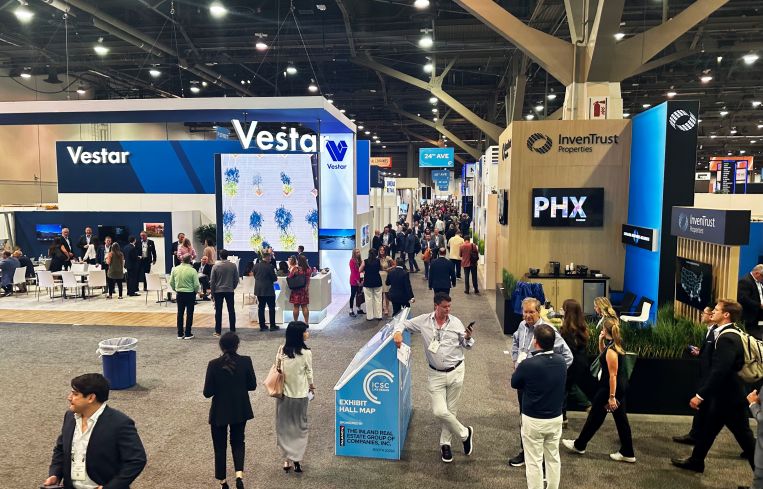As ICSC Las Vegas Wraps, Attendees Lament Too Many Deals and Not Enough Space
By Mark Hallum May 22, 2024 1:42 pm
reprints
Las Vegas ran retail industry players through the ringer yet again at ICSC this year, but spirits were high because business has been decent.
Retail stakeholders seem to have nothing to fear apart from their own ambitions, it would seem, with supply constraints, consumer spending and theft placing the only limits on the sector’s growth, many attendees said over the course of an often grueling three-day convention.
It was clear by the third day that attendees’ energy was spent. Crowds were lighter at the Las Vegas Convention Center, and companies started to pack up their booths at 3:30 p.m.
Could it all be blamed on a hangover? Maybe not, but firms threw their afterparties Sunday and Monday, with probably the most popular being the NY Developers bash at LIV in the Fontainebleau Las Vegas on Monday, where partygoers donned their finest frocks to blow off a little steam poolside while the sun dipped behind the mountains.
Last year, predictions from financial brokers were that equity would be needed to kick-start development deals to add some space into the supply chain, but a year later the new construction pipeline remains stalled by high interest rates.
As of 2024, retailer landlords and developers don’t seem to be in such a hurry that they’ll give up equity in assets and have satisfied themselves with leasing levels in the high 90 percent range across the country. After all, it’s been a rough decade or so for them with the retail apocalypse before COVID-19, pandemic lockdowns and the e-commerce boom.
While it’s good for the landlord, it hasn’t been to the tenant’s benefit exactly.
“The velocity is really high, but deals are taking longer because it’s taking tenants longer to find quality space,” Meghann Martindale, who leads retail market intelligence for Avison Young, told Commercial Observer as the conference was winding down. “In some cases, that high demand and lack of supply has driven rents way up, so they’re having to stomach higher costs than over maybe a year or two ago.”
But while lease negotiations are in the landlord’s court, that doesn’t mean they’re not giving tenants a hand with deals like revenue share in lieu of rent. In such arrangements, the property owner makes more money if the tenant does well, but also doesn’t get paid if the retailer isn’t making any money, according to JLL.
Consumer spending is a concern as well, but most retail industry executives aren’t prioritizing the concern because, while people are spending less, the amount of transactions at brick-and-mortar stores remains stable.
Most seem content to wait out the interest rate storm while others, such as Jim Dillavou, national head of retail investments and retail capital markets for Lincoln Property Company, have been raising funds to buy and build with cash on hand.
But the fact that there just doesn’t seem to be much room for growth in the sector is not as bad as the thought of going backward.
Mark Hallum can be reached at mhallum@commercialobserver.com.



